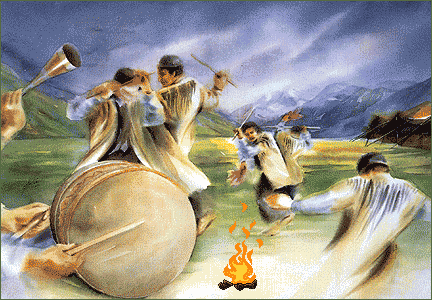
When I was a child and spent the night at my grandparent’s house, my grandmother used to treat me and my siblings with a bedtime story. Her stories were long enough to almost put us to sleep and fantastic enough to have us beg for one whenever we had a sleepover at her house. To this day, I don’t know whether her stories were products of her imagination, passed down from one generation to another, or were actual histories that were embellished.
It was Tuesday night and my siblings, cousins and I were at my grandparents. The five of us were my grandmother’s only grandchildren. Not that she was complaining. As usual, we had implored her to tell us a story before we went to bed. The next day was charshanbeh soori and we were going to celebrate it in our grandparents’ unusually big yard in the smack center of Tehran. She used to tell us the same old stories and sometimes would get tired or forget or would try to short-change us by abbreviating the story. At that point, one of us would say: “grandma, you forgot the part where …” and she would ask us to remind her. We knew that she was too smart to forget and was trying to get done as fast as she could so that she would go back playing hokm with the adults.
She started a story that none of the children had heard before. It was the most abstract story that she had told us. This is the abbreviated version: In the beginning, before there were any humans, animals, or even the sun and planets, god created sky. The next day, god created water. It rained and rained until there was only water and sky. On the third day, god created earth. The earth protruded through the water and gave rise to mountains and land. On the fourth day, god created plants. Some of the plants were incredible and had magic powers and some of those plants don’t exist anymore. Still to this day, some plants still have magical powers. On the fifth day, god created animals that roamed the earth and lived off the plants and water. On the sixth day, god created humans who were the genesis of the world population that we now have. If a human was noble, when (s)he died (s)he would earn wings and live forever in another world. These dead souls were called farvahar. And on the seventh and final day, god created fire. The day that god created fire is Norooz and that’s why the celebration of god’s final creation is most important to us. But before Norooz, on the last Wednesday of winter, we make fire so that our ancestors, the farvahars, can find their way back home and visit with us. We cannot see them but if you’re good, you can feel them. This is the did-o-bazdid with the dead souls before we do the same with our living relatives after Norooz. So go to sleep because you have a long day and night ahead of you and you all need to look fresh for your beloved dead ancestors tomorrow night.
The story was vintage grandma: fantastic, gripping and a bit spooky. Charshanbeh Soori took a different meaning for me from then; although, I never uttered the story to my friends in school or to anyone else until now. Years later, I realized the story wasn’t original and was the oral tradition that had passed on from many generations in many families before Islam. And perhaps was used as a bedtime story even before Zoroastrianism; although, Zoroastrians weaved this story into the narrative of their religion. Today, god’s seven creations are still celebrated by Zoroastrians. For each primordial creation, also known as Ameshaspenta, there’s a feast that lasts five days with the exception of Norooz. For the rest of Iranians, however, from all the seven feasts, only Charshanbeh Soori and Norooz has remained. I wish every Iranian a wonderful Charshanbeh Soori and Norooz.






